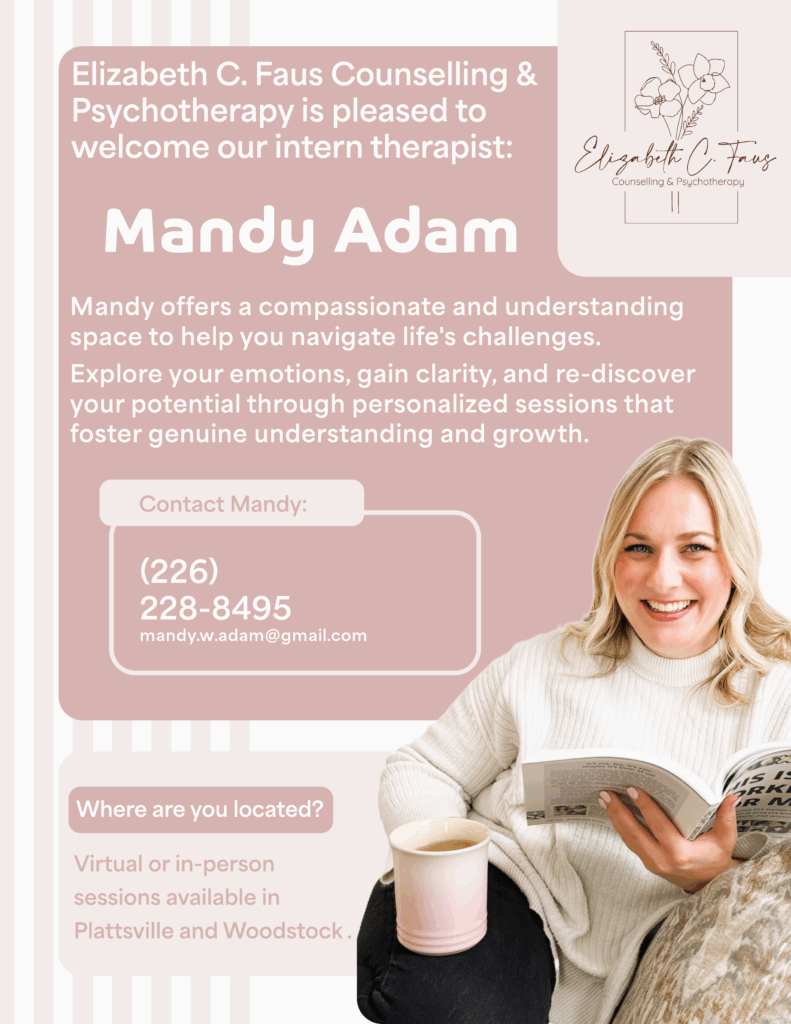
We are excited to be able to expand our mental health support through psychotherapy at Plattsville Natural Health Clinic! We have Mandy Adam, an intern therapist working under the supervision of Elizabeth C. Faus Counselling and Psychotherapy, who will be starting with us May 5, 2025. Mandy will be offering reduced fees for psychotherapy during her student internship at our office. She will be offering individual sessions for only $90 and couples sessions for $150. Welcome Mandy and we look forward to watching you impact the health and care of our patients and community!
If you would like to book with Mandy, simply contact:
Elizabeth C. Faus elizabeth.c.faus@gmail.com or 226-228-0448 to see if Mandy or Elizabeth is the right fit for you.
Mandy Adam mandy.w.adam@gmail.com or 226-228-8495 to speak to Mandy directly.
Do you want to know if Mandy’s style is what you need? See below for a little about her approach:
One time I saw a friend at the store holding a cake. I asked, “What are you celebrating?” He appeared confused, but then realized I was looking at the cake and with a sad smile said, “This is my comfort cake for a tough day.” I wonder how often in life others assume we are celebrating, but underneath our smiles we are hiding our pain. Do you ever feel that way? On the outside everything looks fine but inwardly you are hurting? Maybe it has always felt like no one will ever understand you. My desire as a therapist is to meet you where you are at in your story and to see the world through your eyes.” Source: mandyadam.com
To learn more about Mandy before booking, see below for her bio:
Meet Mandy Adam, an intern therapist at Elizabeth C. Faus Counselling & Psychotherapy, located at the Plattsville Natural Health Clinic. As she concludes the final phase of her Master’s in Counselling, she is dedicated to applying her skills and knowledge to support individuals on their personal journeys. Mandy holds an undergraduate degree in Religious Education and Human Services, which provides her with a solid foundation in psychology and sociology.
Mandy is committed to fostering meaningful connections and believes in the power of compassionate, non-pathologizing spaces where individuals can feel safe and understood. Her collaborative approach emphasizes transformative change through an integrative evidence-based framework. Mandy employs a range of therapeutic modalities, including person-centred therapy, attachment theory, narrative therapy, coherence therapy, art therapy, biopsychosocial approaches, family systems therapy, DBT, ACT, and faith-based approaches.
With experience working with military families, teens, single mothers, and individuals facing burnout, Mandy has a diverse approach to addressing life’s challenges. In her free time, she enjoys glamping with her three kids, reading, and expressing her creativity through writing and art.
For more information: mandyadam.com
Have you benefited from reading this blog? Know someone that would benefit as well? Share, Like, Comment, or Tweet this article, and let me know what you think.
Some of the information provided above may not be appropriate for everyone, please consult with your doctor before trying any of the above. If you are interested in trying any of our services, working with any of our amazing practitioners, or are simply wanting a different approach to your health care needs, contact the Plattsville Natural Health Clinic by calling 226-232-7665 and book your appointment today!




